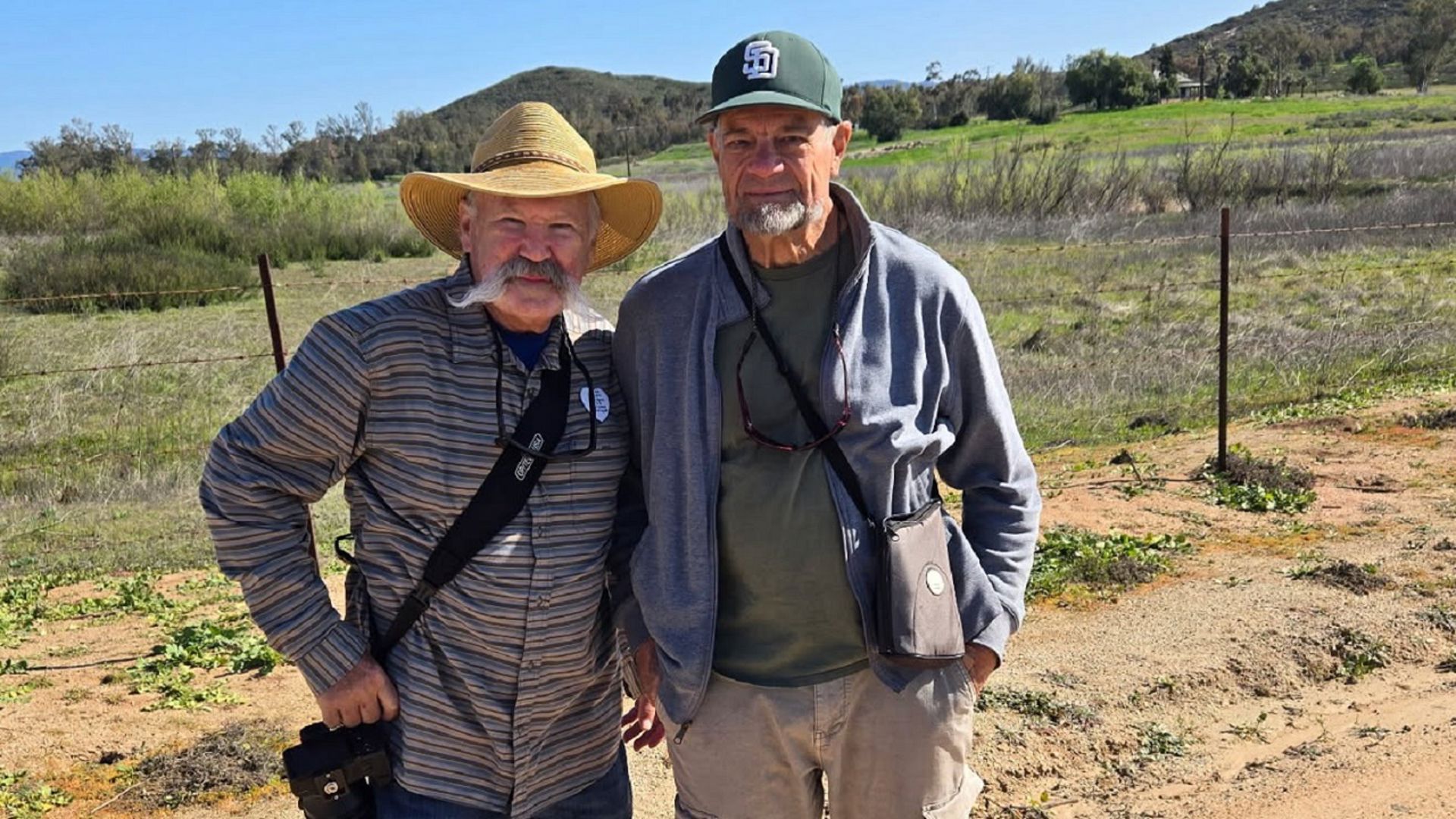
In the early 1960s, Southern California looked very different. With unobstructed coastline views filled with native plants, flora and fauna, and inland valleys sprinkled with thriving local farms and family homesteads, the California lifestyle and daily pace for those living there was unhurried and relaxed.
For Bob Wagoner and Glen Rasmussen, who both spent their childhoods in Irvine, CA, their days were filled with going to school, baseball games and playing outside until the sun went down or when their parents called them home for dinner.
The son of a military family, Wagoner soon found himself moving to Chula Vista, CA, in 1962. After graduating high school, Rasmussen moved to San Diego just a few years later in 1966.
Their two paths would not cross, however, until more than 60 years later in a virtual meeting organized for patients in need of heart transplant surgery at UC San Diego Health.
One Gracious Donation Resulted in a Life Saved
"I experienced my first heart attack in 1994 while surfing with my son, which marked the beginning of my heart health challenges and something I dealt with for years, until I underwent heart transplant surgery at UC San Diego Health in 2022," said Wagoner.
After his initial heart attack in the late 1990s, Wagoner underwent bypass surgery and a myriad of additional, vital treatments for his heart. In 2012, he was diagnosed with congestive heart failure and ventricular tachycardia, a potentially deadly heart rhythm. He then underwent surgery for an Implantable Cardioverter-Defibrillator (ICD), which can also function as a pacemaker.
"At the time of my transplant, I had 10 stents and the pacemaker placed in my heart," added Wagoner.
In December 2020, Wagoner experienced his second heart attack while visiting Yosemite National Park with his wife, and in 2022, his health took a severe decline when his irregular heart beat began occurring more frequently. Wagoner was hospitalized for end-stage heart failure at VA San Diego Healthcare System in La Jolla, where doctors quickly determined he would need a heart transplant.

"We needed to move quickly in order to save Mr. Wagoner's life," said Kimberly Hong, MD, cardiologist at UC San Diego Health with a dual appointment at VA San Diego. "At the time of his arrival, his ICD had activated and delivered multiple electrical shocks."
Just ten days after arriving to VA San Diego, Wagoner underwent heart transplant surgery at Jacobs Medical Center at UC San Diego Health.
"Mr. Wagoner experienced extensive coronary heart disease for nearly 30 years and over time the damage to his heart was at a level in which no medication or surgical intervention other than organ transplantation would help him," said Victor Pretorius, MBChb, cardiothoracic surgeon at UC San Diego Health. "His surgery went well, and it's because of the incredibly gracious donation that one person gave in order for Mr. Wagoner to survive."
The Importance of Peer Support and Mentorship
A few months after his surgery, Wagoner logged on to a virtual support group that is organized for patients undergoing heart transplant at the Center for Transplantation at UC San Diego Health. The Transplant Classes and Support Groups are led by transplant surgery social workers and provide patients with education on their surgery, and the opportunity to meet with other patients currently on the waitlist or who have recently undergone surgery.
Topics covered in these classes and support groups include the evaluation process, how candidates are selected for surgery, what to expect while on the waitlist, the surgery itself, hospital stay, caregiver responsibilities, postoperative care and financial education.
"The process of an organ transplant can be very overwhelming and our team provides a lot of guidance for each patient, but there is something really valuable in having that peer support from someone who went through a similar experience," said Jennifer Hedgecock, LCSW, CCTSW, supervising social worker for heart and lung transplant at UC San Diego Health. "A lot of times, our post-transplant patients who are five- or ten-years post-surgery provide incredible mentorship for others who are just starting the process."
For Wagoner, that mentorship came from someone he recognized on his first virtual support group call, but he couldn't quite place the familiarity.
"Attending my first heart transplant support group, I listened to this gentleman speak and there was just something about him that was so familiar to me, but I didn't know how I knew him," explained Wagoner.
The familiar face was Glen Rasmussen, Wagoner's childhood friend and baseball teammate, whom he hadn't seen since the two were in school together more than six decades prior.
One Hike Changed Everything
While so many things in the two men's early lives were similar, Rasmussen's heart health history was very different compared to Wagoner's.
"Never in my life did I think I'd need to have a heart transplant," said Rasmussen. "But during a trip to Northern California in 2018, while on a hike with my sister, I could not catch my breath or keep up with my family at all."
Concerned, Rasmussen went to see his primary care doctor. Additional testing and a visit to his cardiologist confirmed he had an irregular heartbeat. He was also diagnosed with cardiac amyloidosis, a rare heart condition that causes excess protein, called amyloids, to build up in the heart itself. Over time, the heart can get very stiff, causing it not to beat properly, leading to heart failure.
There are more than 30 types of amyloidosis and each type requires specific tests to confirm the diagnosis. Some forms are hereditary, while others, like Rasmussen's type of amyloidosis, are not. Symptoms of cardiac amyloidosis are similar to those of heart failure and can also include carpal tunnel syndrome, unexplained gastrointestinal symptoms, unexplained kidney disease or neuropathy.
At the time of Rasmussen's diagnosis in early 2019, only one medication was approved by the U.S. Food and Drug Administration (FDA) for slowing the progression of cardiac amyloidosis and UC San Diego Health was a site for the international clinical trial researching the new drug.
"Mr. Rasmussen was referred to me as I had recently launched a new Cardiac Amyloidosis Program at UC San Diego Health, and our team was working toward offering our patients access to therapies recently approved for this condition," said Marcus Urey, MD, cardiologist and director of the cardiac amyloidosis and heart transplant programs at UC San Diego Health.
According to Urey, there is no cure for cardiac amyloidosis and some patients will need a heart transplant, especially if they are diagnosed with late-stage, advanced disease.
Rasmussen remained on treatment until his symptoms became progressively worse. He was added to the organ waitlist for a heart transplant when he unexpectedly fainted while going on a walk in his neighborhood.
"Fainting can be an indicator of advanced disease for patients with cardiac amyloidosis and when that occurred, along with other signs that his health was declining, we recommended that Mr. Rasmussen consider heart transplant surgery," said Urey.
Rasmussen received his new heart at UC San Diego Health in July 2019. To prepare, he joined the heart transplant support group and never stopped going. Three years later, he was contacted by another support group member, Wagoner.
An Unexpected School Reunion
"After a few years of meeting virtually, our support group gathered in person in December 2024, and it was so nice to see all these people who got each other through some really challenging times," said Rasmussen. "It was so much fun to sit and talk with people we felt like we had known forever, and that is when I met Bob officially in person."
"When we met in person, that's when we made the realization of our paths crossing so many years ago," added Wagoner.
“The process of an organ transplant can be very overwhelming and our team provides a lot of guidance for each patient, but there is something really valuable in having that peer support from someone who went through a similar experience.”
— Jennifer Hedgecock, LCSW, CCTSW, supervising social worker for heart and lung transplant at UC San Diego Health

The two men lived in the same Irvine neighborhood when growing up, attended the same elementary school and were even on the same Little League baseball team.
"We were the worst team in the league that season, and the only game we actually won was when Bob played catcher and I played pitcher," laughed Rasmussen.
After moving to San Diego, both men went on to attend San Diego State University in the 1970s and started their careers, but didn't reconnect until their chance encounter at UC San Diego Health. Over the decades, they've also shared similar interests, including playing music, hiking, birding and enjoying nature.
"We've lived such similar, parallel lives for so many years and it's because of UC San Diego Health that we have reconnected," added Wagoner. "We get together often now, especially because of our shared medical histories, interests and hobbies."
'Ask Me About My Heart Pin'
When asked about their heart transplant surgeries, both men expressed deep gratitude for their organ donors and donor families.
"The biggest thing I grapple with is that through someone else's tragedy, I was allowed to live," said Rasmussen. "I have this perspective that life is short and it can be taken away at any moment so whenever I introduce myself to people, I often tell them I'm a heart transplant recipient in honor of my organ donor — it's an incredibly big deal to be a donor."
Wagoner agreed as he pointed to a heart-shaped pin he wears every day on his jacket lapel or shirt.
"My button says, 'I wear green in honor of the organ donor that saved my life,' and it gives me the opportunity to share with others about the importance of organ donation," said Wagoner. "It was an unselfish act on the part of my donor and their family, and I'm indebted to them."
According to Donate Life California, more than 100,000 Americans are currently waiting for an organ transplant and approximately 22,000 live in California. Sadly, an average of 22 patients die every day while waiting because the organ they needed was not donated in time.
Looking at such grim statistics, many organ recipients experience a roller coaster of emotions, fear of the unknown and uncertainty of why this is happening to them.
"The act of a person donating their organ so that others can continue to live, and the recipient knowing that the heart in their chest once belonged to someone else, is incredibly emotional," said Hedgecock. "This experience is something only our patients truly know, and it's really valuable to have support from other people who have gone through a similar situation, which makes me so happy that Glen and Bob have found each other through our group."
Hedgecock added that many donor recipients involved in the heart transplant support group feel lucky to be alive and want to use this second chance to give back to others, which leads them to becoming peer mentors for others just beginning the process.
Now six and three years post-op, Rasmussen and Wagoner continue to attend the monthly support group at UC San Diego Health so they can be there for others in need and share their experiences. They also get together regularly to go birding and hiking together, often in the Santa Ysabel Valley of eastern San Diego.
"I tell my wife each morning when I wake up, 'today is another bonus day,' and while the journey is different for everyone, we have to remember it will get better," said Wagoner.
"I'm so grateful to the medical team who helped save my life. They were able to take all the love from my old heart and put it into my new one."
Organ Donation Saves Lives
Globally and nationally, there is a donor organ shortage. Choosing to become an organ donor is the ultimate gift of life for those currently on the national organ transplant waiting list.


